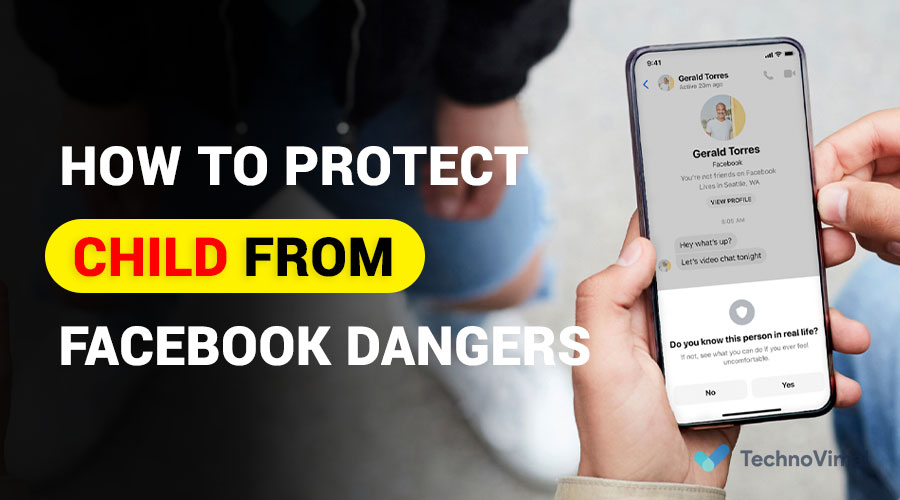In the ever-evolving digital age, social media platforms like Facebook have become an integral part of our lives. While these platforms offer immense potential for connection, information sharing, and entertainment, they also pose unique risks to children and young people. As responsible adults, it is our duty to understand the potential dangers lurking on Facebook and take proactive steps to safeguard our children from harm.
This comprehensive guide will delve into the various threats children may encounter on Facebook, providing practical strategies and essential tips to mitigate these risks and ensure a safer online experience for our young ones.

1. Understanding the Risks: A Deeper Dive into Facebook Dangers
To effectively protect children from Facebook dangers, it is crucial to have a clear understanding of the potential threats they may face. These risks can be broadly categorized into the following areas:
- Inappropriate Content: Facebook, being a vast and open platform, can expose children to age-inappropriate content, including violent or sexually explicit material, hate speech, and cyberbullying.
- Online Predators: Unfortunately, Facebook can serve as a hunting ground for online predators who seek to exploit vulnerable children for sexual or other malicious purposes.
- Cyberbullying: The anonymity and reach of social media platforms can facilitate cyberbullying, where children are subjected to hurtful or threatening messages, images, or videos.
- Privacy Concerns: Children may inadvertently share personal information, such as their location, school, or family details, which can compromise their privacy and safety.
- Addiction and Mental Health Risks: Excessive use of social media can lead to addiction, sleep deprivation, and mental health issues such as anxiety, depression, and low self-esteem.
2. Empowering Children: Building Digital Literacy and Resilience
Equipping children with the knowledge and skills to navigate the digital landscape safely and responsibly is a fundamental step in protecting them from Facebook dangers. This includes:
- Digital Literacy Education: Teach children about online safety, privacy settings, and responsible social media use. Encourage them to be critical thinkers and to question the authenticity and credibility of information they encounter online.
- Open Communication: Foster an open and trusting relationship with your child, where they feel comfortable discussing their online experiences, concerns, and challenges. Encourage them to come to you with any issues they may encounter on Facebook or other social media platforms.
- Setting Boundaries and Expectations: Establish clear rules and expectations regarding social media use, including age-appropriate platforms, time limits, and appropriate online behavior.
- Encouraging Positive Online Interactions: Guide children towards using social media for positive purposes, such as connecting with friends and family, sharing their interests, and engaging in meaningful online communities.
3. Parental Involvement: Active Monitoring and Engagement
While empowering children with digital literacy is crucial, parental involvement remains essential in safeguarding them from Facebook dangers. This includes:
- Monitoring Online Activity: Keep an eye on your child’s online activities, including their Facebook profile, posts, and interactions. Be mindful of their online friends and the content they share.
- Regular Conversations: Engage in regular conversations with your child about their online experiences, including their interactions with others, the content they consume, and any concerns they may have.
- Setting Privacy Settings: Work with your child to set appropriate privacy settings on their Facebook profile, ensuring that personal information is not publicly accessible.
- Encouraging Responsible Social Media Use: Guide your child towards using social media responsibly, emphasizing the importance of being respectful, kind, and ethical in their online interactions.
4. Reporting and Blocking: Taking Action Against Harmful Content and Users
In cases where children encounter inappropriate content, online predators, or cyberbullying, it is essential to take immediate action to report and block the offending individuals or content. Facebook provides various reporting and blocking features that can be utilized to address these issues:
- Reporting Inappropriate Content: If your child encounters inappropriate content, such as violent or sexually explicit material, hate speech, or cyberbullying, report it to Facebook using the reporting tools available on the platform.
- Blocking Users: If your child is being harassed or bullied by a specific user, block that user to prevent further contact. Facebook also allows users to block pages, groups, and applications.
- Seeking Support from Facebook: If the situation is severe or involves online predators, consider reaching out to Facebook’s support team for assistance. They can provide additional guidance and take appropriate action against the offending individuals or content.
5. Additional Protective Measures: Enhancing Online Safety
Beyond the aforementioned strategies, there are additional measures parents can take to enhance their child’s online safety on Facebook:
- Use Parental Control Apps: Consider using parental control apps or software to monitor and restrict your child’s online activities, including their access to certain websites, apps, and social media platforms.
- Encourage Strong Passwords: Ensure that your child uses strong and unique passwords for their Facebook account and other online accounts. Regularly update these passwords to maintain security.
- Enable Two-Factor Authentication: Activate two-factor authentication for your child’s Facebook account to add an extra layer of security. This requires a second form of identification, such as a code sent to their mobile phone, when logging in.
- Stay Informed About Online Trends: Keep yourself updated on the latest online trends, challenges, and potential risks that children may encounter on social media platforms. This knowledge will help you stay proactive in addressing emerging threats.
Conclusion:
Protecting children from Facebook dangers requires a collaborative effort involving parents, educators, and social media platforms. By empowering children with digital literacy, fostering open communication, actively monitoring their online activities, and taking action against harmful content and users, we can create a safer online environment for our young ones.
It is crucial to remember that online safety is an ongoing process, and we must remain vigilant in our efforts to safeguard children from the potential risks lurking in the digital realm.



![Free Premium Blogger Templates Download [July 2024] premium blogger template free download](https://www.technovimal.in/wp-content/uploads/2021/06/premium-blogger-template-free-download-100x70.jpg)